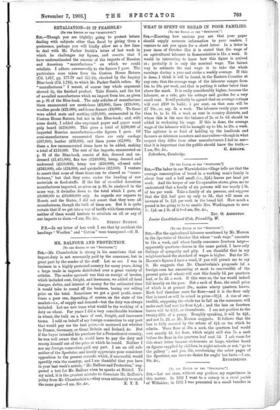MR. BALFOUR AND PROTECTION.
[To THE EDITOR OF THY " SPECTATOR."] Stu,—Mr. Chamberlain is strong in his assertions that an import-duty is not necessarily paid by the consumer, but in great part by the sender of the stuff. Let us see. I was in business in a highly protected country for many years, doing a large trade in imports distributed over a great variety of articles. The modus operandi was that on receipt of invoice, which included cost, freight, and insurance, we added all local charges, duties, and interest of money for the estimated time it would take to round off the business, basing our selling price on the total. Sometimes we got a good profit, some- times a poor one, depending, of course, on the state of the market—i.e., of supply and demand—but the duty was always included. Let me now trace what would be the working of a duty on wheat. For years I did a very considerable business in wheat, the bulk on a basis of cost, freight, and insurance terms. I sold on behalf of my foreign connection to any port that would pay me the best price,—it mattered not whether to France, Germany, or Great Britain and Ireland, &c. But if the buyer intended his purchase for a Protectionist country, he was well aware that he would have to pay the duty and recoup himself out of the price at which he resold. Neither I nor my foreign connection paid any part. I am an old sub- scriber of the Spectator, and keenly appreciate your consistent opposition to the present crusade, which, if successful, would speedily ruin the country; and I am thankful that you have in your last week's article, "Mr. Balfour and Protection," sug- gested a test for Mr. Balfour when he speaks at Bristol. To my mind, it is the greatest mistake to dissociate Mr. Balfour's policy from Mr. Chamberlain's,—they mean ultimately to reach






























































 Previous page
Previous page